Education Justice Project: Motivating Prison Scholars for Change
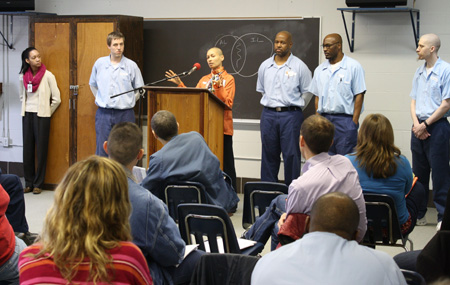
Rebecca Ginsburg (at the podium) speaks to the EJP students at the Danville Prison.
May 24, 2013
Every Friday evening, four or five educators car pool from campus over to the Danville Correctional Center to teach at the medium- to high-security prison for men. Part of the Education Justice Project (EJP), between 60–70 professors, graduate students, and others from a variety of disciplines volunteer their time to teach workshops on topics ranging from STEM (Science, Technology, Engineering, & Mathematics) to Shakespeare.
Housed in the College of Education, EJP, now in its sixth year, has something going on practically every night. According to Co-Founder and Director Rebecca Ginsburg, students can study "everything a good liberal arts education provides." Programs range from remedial, such as tutoring; an ESL program where EJP students themselves mentor their peers; reading or writing; to STEM workshops like advanced statistics, robotics, and evolution. A course on creating websites is also in the works.
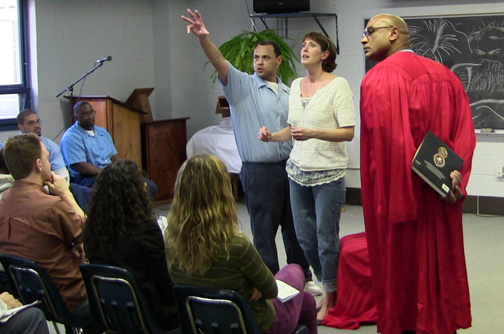
EJP students in the Shakespeare class perform The Tempest. (Photo courtesy EJP website.)
And not only did EJP students in the Shakespeare class learn about the Bard and his plays, they recently performed The Tempest.
Students in the "Mindfulness" discussion group read about issues related to the mind (psychology, neurobiology, etc.), then practice what they have read and studied. In another program, Sustainability, which grew out of the governor's initiative to create more sustainable institutional environments in Illinois, each year they complete a different project (this year's is composting), then share the instruction manual with other facilities across the state.
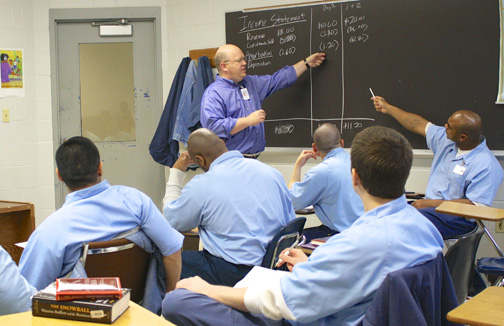
Mito Otto (at the blackboard) and an EJP scholar discuss compounding during his Investing workshop.
Typical workshops meet for about four weeks, three hours a week. However, one workshop meets every quarter. When EJP tutor Milt Otto discovered that some of the guys were interested in learning about investing in the stock market, he volunteered, "Hey, I could teach a workshop on that," so the EJP signed him up. Students in his workshop read and discuss books by investing gurus to learn the various schools of thought. Students also pick a few individual stocks to watch and keep track of how much money they might have made—or lost—had they actually invested in it vs. an index fund. Otto even purchased a newspaper subscription so the students could keep tabs on stock market fluctuations in between sessions. The main message he wants scholars to come away with: rather than putting all one's money into one stock, diversification minimizes the risk.
As in the case of Milt Otto, some of EJP's teaching force is comprised of instructors who volunteer to teach a certain area in which they have expertise. Other instructors are recruited. Most teach courses regularly because—like the familiar potato chip slogan—after trying it just once, they couldn't stop.
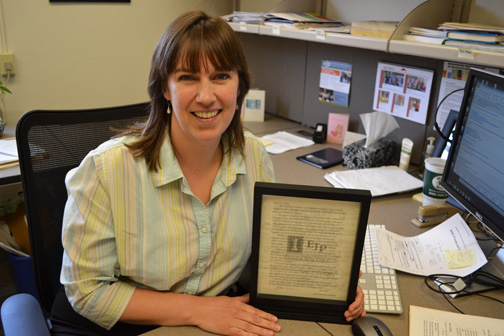
Sarah Lubienski proudly displays an award she recently received from the prison for her work there.
Sarah Lubienski admits she's hooked. Her first experience with EJP was teaching an educational statistics course several years ago. "It was great. Once you go out and teach, you get hooked, because it's such a pleasant experience. There are no cell phones; there are no distractions. The guys are really committed to learning. So it's such a refreshing experience to teach the guys, and they are totally excited to be involved." Now, she's not only a regular, but is EJP's Science and Math Workshop Coordinator.
Otto also finds teaching the EJP scholars to be extremely rewarding. "EJP is this amazing thing that shows you things that you just didn't think really existed...It's one of those things that I feel like I always get more out of it than I jput into it."
Director Ginsburg is ecstatic about the quality of the volunteers. "Certainly the people who are involved make it what it is. We are lucky to have people like Sarah (Lubienski)…people who are thoughtful about incarceration and thoughtful about criminal justice…more than thoughtful, obviously. They want to do something and not just think about it, not just discuss it. And it's been a magnet for attracting people who are really wonderful and committed and hardworking, and doing it all for free."
EJP Students: Motivated to Learn, Change
And the instructors aren't the only ones who are committed and hard working. EJP students are extremely motivated. For example, to even get into EJP, which offers 300 to 400-level (junior/senior-level) courses, students must have an Associates degree. (They can get one through Danville Area Community College's program, which offers 100 to 200-level courses.) Many EJP scholars, who range in age from 20 to 60-year-olds, have been in the prison for quite a while, and have worked their way up. Some began by getting their GED.
"It's not for everybody," says Ginsburg. "It's a lot of work; you have to sacrifice. Our students work hard. Most of them have jobs at the prison, so they give up things like yard time or gym time, or time on the telephone, or time in the showers, frankly, because those are all tightly scheduled, to get that time to participate in the program."
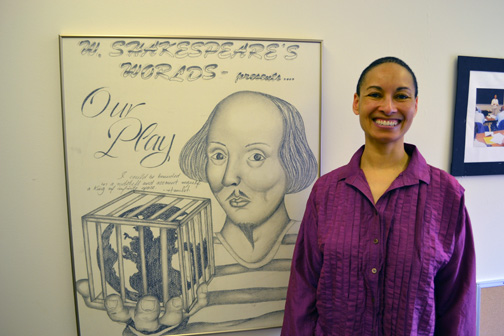
Rebecca Ginsburg poses by a poster of the EJP Shakespeare class's presentation of The Tempest.
And just like the instructors, EJP students, with their thirst for knowledge, get "bitten by the bug," as Ginsburg calls it, and seem to thrive on the hard work and new experiences. "These people in The Tempest, for example. If two years ago you would have asked any of them if they see themselves acting in a Shakespeare play, they would have laughed in your face. But they got exposed; they got bitten; and that's kind of the EJP spirit. They said, 'Let's try this; let's experiment with it,' and they loved it. I think students who are drawn to EJP are pretty together, pretty mature, pretty disciplined, and not everybody who is incarcerated is like that."
Otto agrees that EJP sholars are special. He calls them "focused and aware of the opportunity that a university education presents…They've made their mistakes, and they have their regrets, and they see this opportunity and recognize it. All of the teachers that you talk to who've taught out there just say, 'I would give my left arm to have the students in my regular classes be as focused and engaged as these guys are,' because they're just like sponges, who are soaking the stuff up.'"
Otto appreciates the opportunity EJP is for the scholars: "A lot of these guys come from backgrounds where going to college was just not on their mental map as something that was possible for them to do. So when you see these guys taking classes and succeeding at them, you just see this door opening on their mind, in terms of, 'Wow, I can do this!'" Otto goes on to relate a story illustrating the mindset of most EJP students. Evidently, in the first three years, guys had been arguing with the teachers about their grades—and not that they deserved a better grade like most college students would do: 'Come on, we want you to grade us just like you would your undergrads at the U of I. Don't give us a good grade just because we're in prison.'"
Ginsburg stresses that the program isn't just about attending classes, but it's more of a self-improvement community that gives its members a sense of purpose. "It's a bigger picture. We talk a lot about who we are, what we do, and why we do it, where we've been, and where we're going."
Lubienski agrees that EJP students reap benefits beyond just taking some classes. "They are more motivated to get out and really change their lives."














.jpg)
















